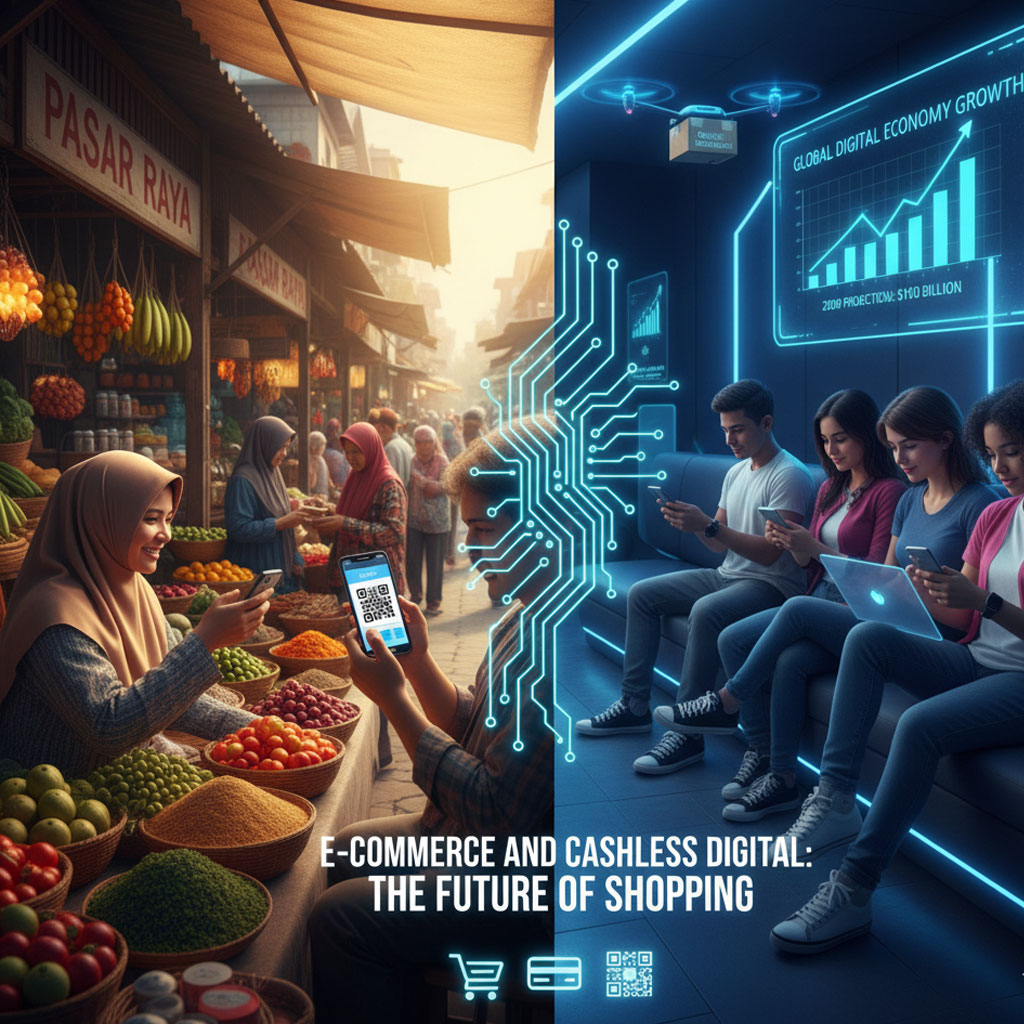Premium Biz Post – The evolution of shopping behavior in today’s modern era is increasingly shaped by technological advancement. The rise of E-Commerce and Cashless Digital has pushed society to shift from traditional shopping methods to more practical, faster, and safer alternatives. This phenomenon is not just a trend but a crucial part of the digital transformation that has spread into nearly every aspect of daily life, especially in commerce.
The Digital Shopping Era: From Conventional Markets to Virtual Platforms
In the past, shopping was synonymous with traditional markets or malls. Today, people can fulfill their needs with just a few clicks on their smartphones. E-commerce platforms offer thousands of products with various prices, qualities, and attractive promotions. This digital shift doesn’t just provide convenience; it also reshapes consumer behavior to become more efficiency-oriented.
Moreover, the global pandemic that once struck accelerated digital shopping adoption. Many people who were initially hesitant about online shopping have now made it a routine. Online shopping is no longer viewed as an alternative but has become the primary lifestyle for a large portion of society.

The Role of Cashless in Simplifying Transactions
Alongside the rapid growth of e-commerce, payment systems have also undergone a massive transformation. Digital wallets, QR payments, debit cards, and pay-later services have all emerged as solutions that make transactions easier. Going cashless is not only about convenience but also about building a broader digital economy ecosystem.
Cashless systems bring efficiency, security, and transparency. Consumers no longer need to carry large sums of physical money. For business owners, digital payments simplify financial records and reduce the risk of transaction leaks.
Unsurprisingly, the Indonesian government has been encouraging rapid digital transaction adoption. Data from Bank Indonesia shows that QRIS and e-wallet transactions have been growing significantly year by year. This proves that the public is becoming increasingly comfortable with cashless transactions.
Baca Juga : “Handmade Craft Recommendations to Sell Online“
E-Commerce and Cashless Digital: A Global Trend
The phenomenon of E-Commerce and Cashless Digital is not only happening in Indonesia but has also become a global trend. Advanced economies such as China, South Korea, and the United States have already implemented these shopping patterns. In these countries, consumers rarely use cash since almost all transactions can be carried out digitally.
In Indonesia, this trend is expanding in line with the growth of its digital economy, which is projected to reach hundreds of billions of dollars by 2030. Younger generations, especially Gen Z and millennials, are the driving force as they are highly adaptive to technology.
E-commerce provides easy access to everything, from daily necessities, fashion, and electronics to digital entertainment services. Meanwhile, cashless payments support the ecosystem by offering fast and secure transaction experiences.
Benefits and Challenges
Digital shopping transformation brings numerous benefits. First, consumers can easily compare prices before making a purchase. Second, products that were once hard to access are now within reach from anywhere. Third, the payment process becomes faster without the hassle of carrying physical cash.
However, this development also comes with challenges. Data security, the risk of online fraud, and impulsive shopping behavior are issues that must be addressed. For this reason, digital literacy education is crucial so that consumers can make better, more informed decisions.
Business players must also focus on service quality. Fierce competition in e-commerce requires innovative strategies such as creative promotions, faster deliveries, and responsive customer service. Without these, customers can easily switch to other platforms.
Government and the Future of Digital Economy
The Indonesian government continues to encourage financial inclusion through digitalization initiatives. The nationwide QRIS rollout, internet infrastructure expansion, and support for MSMEs to enter e-commerce platforms are strategic steps to strengthen the digital ecosystem.
With the right regulations, people will grow even more accustomed to digital shopping patterns. In fact, in the near future, cash transactions may significantly decrease as digital payment methods dominate.



